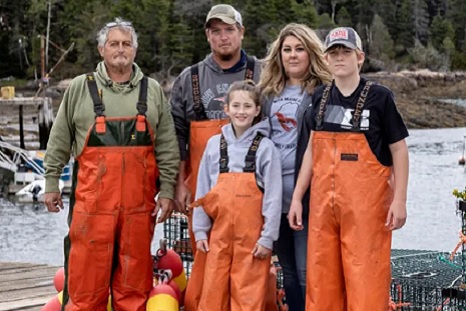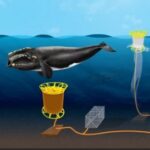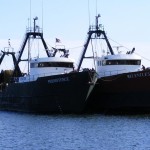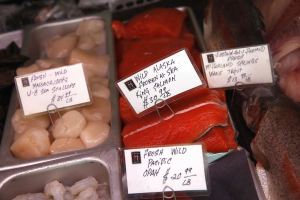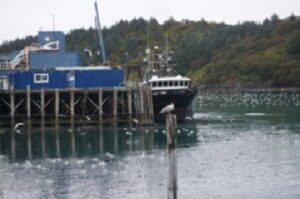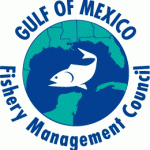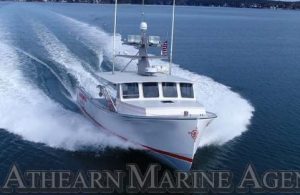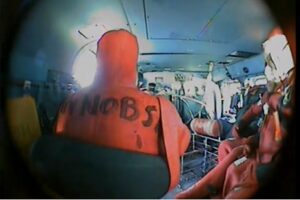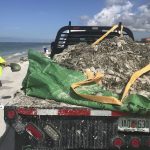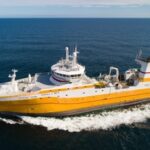Tag Archives: NMFS
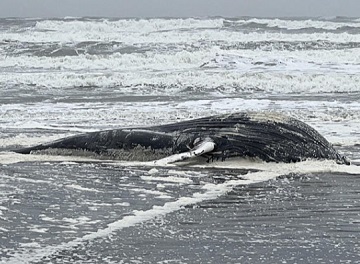
Ignoring dead whales, NOAA proposes another site survey off New Jersey
“Damn the whales, full speed ahead” seems to be the offshore wind policy of Biden’s NOAA. They now propose to approve yet another site survey, just 10 miles off Atlantic City. These surveys are the top suspect for the recent wave of dead whales, centered on New Jersey. The site is a big one because the offshore wind project is huge. Phase 1 is a whopping 1,500 MW, which means over 100 monster turbine towers. The survey area is around 1,500,000 acres or an incredible 2,300 square miles. Ironically the project is called Atlantic Shores, which is where all the dead whales are washing up. More deeply, the Atlantic Shores Wind Project has yet to be approved and may never be. Hugely disruptive site surveys should not be authorized until the Project is approved. >click to read< 13:57
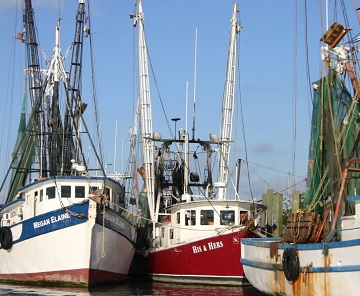
Louisiana denounces federal rule for shrimp boats at Fifth Circuit
The small shellfish are big business in Louisiana with 15,000 residents employed in the industry, which has an annual economic impact of $1.3 billion for the state, according to its Seafood Promotion and Marketing Board. But Louisiana shrimpers who followed their fathers and grandfathers into the trade say it is dying as wild-caught and farm-raised imports from Thailand, Vietnam, Indonesia and India into the U.S. have exceeded 1 billion pounds annually in recent years. Since 1987, the National Marine Fisheries Service has required shrimp trawlers in some circumstances to install turtle excluder devices, which separate sea turtles, sharks and other large bycatch so they can escape through an opening in the netting. >click to read< 09:52
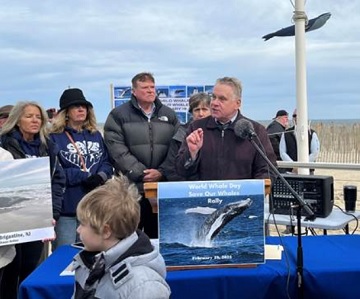
“Save Our Whales” Rally on “World Whale Day” in Point Plesant Over Concerns of Recent Whale Deaths
Rep. Chris Smith (R-Manchester) called for immediate answers from the Biden Administration and Governor Murphy to the growing questions raised by him, county and local officials, environmental leaders, and concerned Jersey Shore residents over the massive offshore wind projects along the New Jersey-New York coastline in light of the recent unprecedented surge in whale deaths. The rally comes less than a week after a dead whale washed ashore in Manasquan and just two days after another dead whale washed ashore in New York, marking the ninth and tenth whale deaths in the area since early December. Photos, >click to read< 08:54
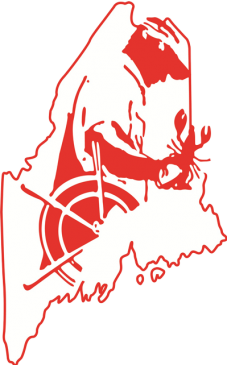
Maine Lobstermen’s Association Statement on Omnibus Appropriations Bill
12/20/2022 -Today, U.S. Senators Susan Collins and Angus King, Representatives Chellie Pingree and Jared Golden, and Governor Janet Mills announced that they were successful in securing a regulatory pause for Maine’s lobster industry in the Omnibus funding package that is expected to pass the Senate and House this week. Following is a statement from Patrice McCarron, Executive Director of the Maine Lobstermen’s Association: “The Maine Lobstermen’s Association (MLA) is encouraged that Congress recognizes that the federal rulemaking process intended to protect right whales is broken. Please >click to read the statement< The comment section is open.16:09
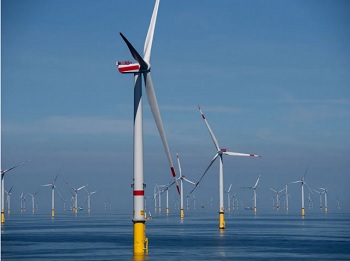
Offshore Wind Farms in New England Create Headaches for Both Man and Beast
“I don’t think ever in history has there been such a massive alteration of the ecosystem in such a short amount of time,” says the executive director of New Jersey-based Clean Ocean Action, Cindy Zipf. “We’re looking at 3,500 turbines as tall as the Chrysler Building, 2.2 million acres of ocean, and 10,000 miles of cable just in the Northeast in just the next seven years.” At the center of the conflict is the North Atlantic right whale and other endangered marine mammals that the Commerce Department’s National Oceanic and Atmospheric Association National Marine Fisheries Service are charged with protecting. Fewer than 350 right whales are left in the Atlantic Ocean, according to the fisheries service. >click to read< 08:14
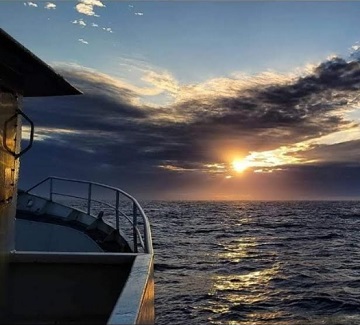
Jerry Leeman: Fishing is my life. Somewhere, people forgot to listen to the generations before us.
I’ve spent all my life on the ocean. My family and friends are fishermen and lobstermen. I grew up on an island in Maine and almost everyone was in some form of fishery, whether it be groundfishing, gill netting, seining and lobstering. We even had shrimping till that was mis managed away. I grew up watching these men and women harvesting the ocean. Rules were put into place to harvest the ocean responsibly and sustainably for future generations. Most people in this nation know little to as of why our fish stocks became depleted. Other nations like Russia and other European super trawlers were allowed to pillage our waters along the New England coast. They were eventually banned, but the destruction had been done. We’ve spent years restricting ourselves fishing, going out of our way bending backwards to rebuild our fish stocks. >click to read< By Jerry Leeman 11:19
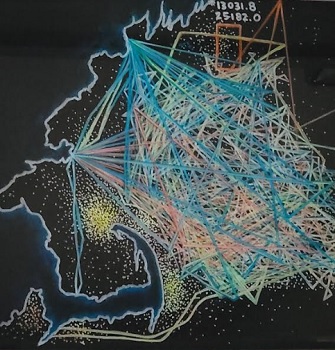
What’s wrong with the management?!! By Jerry Leeman
So, I’m using this piece of artwork, because I’m not driving 3 states away to pull up all my tracks. This is only a piece of artwork depicting a small percentage of the ground I’ve covered in the Gulf of Maine and George’s Bank. We all talk about the best science, while the best science is done when you have the best observations. That is the whole basis of science is study thru observations. How come a man like me who has over 14 years documented at sea in 21 years not have a voice in the management of our nation’s fishery? No one has ever asked me what I am seeing. They just hand me a piece of paper every time there’s a rule change. Then I figure out how I’m going to manage what little abundance they allot me. Please click to read the rest. >click to read< 15:07
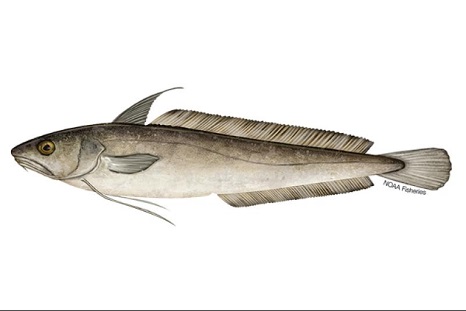
Jerry Leeman – A supply line disruption
Allow me to explain what is about to happen. We are fishing on false assumptions that there are no white hake. If you are a fisherman, I’m sure you can tell that is untrue. Regardless of the price of fuel rising and this hake quota brought to us by NOAA and NMFS. It’s become a supply line disruption. The infrastructure needs a steady supply of fish to keep steady markets open. Here lies the problem. Fishermen are going out of their way to avoid a specie that live in the same habitat as other species. So, for the sake of the hake restriction, they are avoiding those areas. So that means the supply line is cut for the other species. Which means cutting houses and fish markets are paying for folks to sit idle. No supply no product no income. So, they have to lay off folks. Please read the rest. >click to read< By Jerry Leeman 08:40
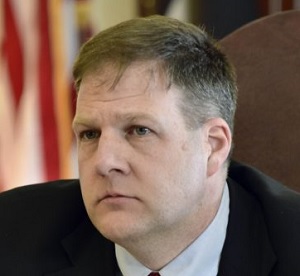
NH to join Maine in challenging North Atlantic right whale fishing regulations
Gov. Chris Sununu announced New Hampshire would join the state of Maine in federal court to appeal a Biden administration regulation to protect the endangered north Atlantic right whales that he said would cripple the region’s lobster industry. A U.S. District Court judge last month upheld a National Marine Fisheries Services (NMFS) regulation environmental groups sought in response to the whale population, estimated to be around 340 animals in the Atlantic waters of the U.S. and Canada. “This ruling, if upheld, would devastate New England’s lobster industry with restrictive regulations brought on by the federal government,” Sununu said in a statement. >click to read< 08:52

Save Right Whales from Radical Environmentalists Who Exploit Them
Americans agree with protecting the endangered Northern Atlantic right whale. But true conservation efforts don’t necessitate displacing lobstermen and recreational anglers in the process. With fewer than 350 whales left, ambulance-chasing opportunists masquerading as conservationists conveniently swoop in on the whale’s behalf only to leave economic —and environmental—destruction in their paths. This endangered whale requires protection from radical environmentalists who exploit them. Preservationists purporting to care about its well-being, however, distort the threats posed to the whales. >click to read< 08:06
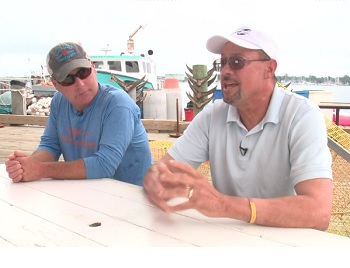
Maine lobstermen say ‘red listing’ a threat to their livelihoods without cause
“I truly believe the lobstermen have done everything we’ve been asked by National Marine Fisheries and the DMR,” said Gerry Cushman, who has been lobstering in Port Clyde for 38 years. “We’re not the bad guys here,” he said. “You ask us to do it, we do it. So why are you putting us on the red list? “ The Seafood Watch listing is recommending consumers not buy American lobster from either the U.S. or Canada. Maine is the primary producer of that lobster for the U.S. Cushman said he believes Seafood Watch has taken the action against Maine fishermen to pressure them to stop fighting proposed regulations in court. Steve Train, a lobsterman from Long Island in Casco Bay, echoed those points, saying Maine fishermen have followed all the whale protection rules, even though they have also been challenging them in court. Video, >click to read< 19:37

On The Ropes – Federal court rules against lobster industry in appeal of whale protection regulations
“Obviously, it’s devastating to the lobster industry,” Stonington Town Manager Kathleen Billings told the Islander. Stonington lands by far the most lobsters in the state. In total, Maine lobstermen added an estimated $724,949,426 worth of lobster landings to the state commercial fishery in 2021. “We have a lot at stake,” Billings continued. “[Lobstering] makes up $60 [million] to $70 million to our economy and to have this recent ruling, and also too with the Seafood Watch list designation, they pretty much put a torch to our industry and burnt it to the ground for us.” >click to read< 08:55
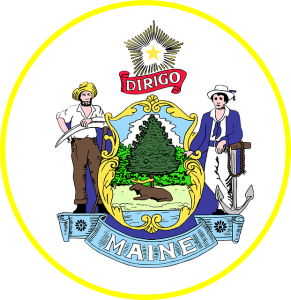
Maine Delegation Presses Fisheries Agency for Fair Treatment of Maine Lobster Fishery
After the National Marine Fisheries Service (NMFS) gave lobster industry participants just two business days to submit proposals for a new risk reduction plan to protect right whales and denied lobstermen and their allies access to a key data tool, Maine’s congressional delegation pushed back today against these decisions by the agency. In their letter to NMFS, Congressman Jared Golden (ME-02), Senators Susan Collins (R-ME) and Angus King (I-ME), and Congresswoman Chellie Pingree (ME-01) called out the agency for drastically accelerating the timeline for proposals in the aftermath of a recent decision by the U.S. District Court invalidating a biological opinion for the North Atlantic Right Whale. >click to read< 09:21
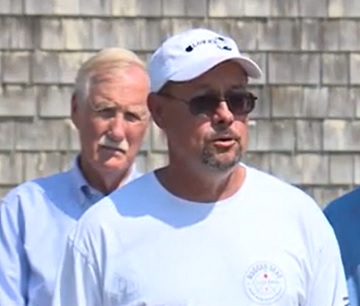
Maine lobstermen, politicians rally in protest of fishing restrictions and Seafood Watch’s recommended boycott
At a rally in Portland’s Old Port on Friday, they protested a federal judge’s ruling issue Thursday allowing the National Marine Fisheries Service, a branch of the National Oceanic and Atmospheric Association to impose limits on where and how lobstermen fish in order to protect endangered North Atlantic Right Whales. The rally was also protesting Seafood Watch, a California-based sustainable seafood advocacy group affiliated with the Monterey Bay Aquarium, now recommending food distributors and restaurants boycott Maine lobster in the name of saving the whales. Video, >click to read< 09:55

NMFS survey delivers more bad news to Bering Sea crab fleet
A Bering Sea survey by federal scientists contains more bad news for Alaska, Washington and Oregon-based crabbers hoping for an upturn in upcoming harvests that last year fell to rock-bottom levels. The federal survey results for Bristol Bay king crab are bleak and crabbers have been warned that for a second consecutive year there may not be a fall harvest, according to Jamie Goen, executive director of the Alaska Bering Sea Crabbers. “We have got an emergency,” Goen said. “I’m trying to get Congress to act to help.” The National Marine Fisheries Service survey does offer hope for improved harvests three to five years from now, as young snow crabs grow to adult size. >click to read< 12:20

NOAA lays out plans for expanded testing of ropeless fishing technology
In an effort to address the two main causes of human-induced whale mortality, vessel strikes and entanglement in fishing gear, the National Oceanic and Atmospheric Administration recently released rules to reduce ship speeds and its “Ropeless Roadmap” to prepare for widespread adoption of ropeless fishing. The vertical lines that connect strings of traps on the ocean floor to buoys on the surface can get caught on a whale’s fins or in its mouth as it swims, leading to death in some cases. There are fewer than 350 North Atlantic right whales, according to NOAA. On-demand fishing gear would eliminate the need for the vertical lines in the water until the lobster trap, pot or gillnet is being hauled. >click to read< 15:50
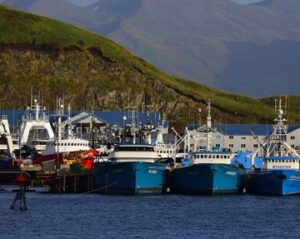
Regardless of party or office, Alaska candidates are targeting trawling
Republicans, Democrats and independents seeking a variety of elected offices across Alaska appear united by a desire to restrict deep-sea trawling. In candidate questionnaires submitted to the Alaska Beacon, candidates for statewide and legislative races, regardless of party, say the restrictions are the best way to improve salmon returns on the Yukon and Kuskokwim rivers. “I support efforts to reduce the wasteful bycatch of Alaska’s seafood by Seattle-based high seas fishing corporations,” said Mary Peltola, the Democratic candidate for Alaska’s U.S. House seat. “Science provides the best guide. However, I think most Alaskans agree it is past time to get high seas trawler bycatch under control,” said Tuckerman Babcock, a Republican candidate for an Alaska Senate district on the Kenai Peninsula. >click to read< 19:46

DC North Atlantic Right Whale Ruling
“The MLU is exploring all legal options to ensure that forthcoming judicial decisions on NOAA and NMFS’s arbitrary assumptions will finally result in some meaningful protections for the NARW that do not needlessly jeopardize Maine’s heritage industry without any corresponding benefit to the right whale population” Virginia Olsen. Judge Boasberg was correct in stating “the crux of the problem is that the 2021 BiOp projects that in the coming years the American lobster fishery will continue to potentially kill and seriously injure North Atlantic right whales at over three times the sustainable rate.” That projection is not supported by the best scientific available – far from it in fact. Until NOAA and NMFS stop relying on arbitrary assumptions and apportionments and start paying attention to the best scientific data available, which reveals that Canadian fisheries are the source of almost all known causes of entanglements, then both the North Atlantic right whale and the American lobster fishery will go extinct. 13:02
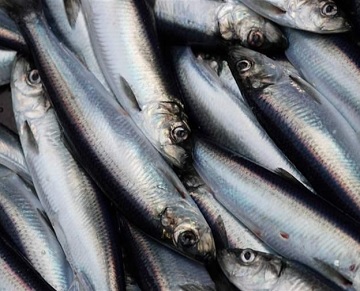
Midwater trawler critics intend to appeal court decision
Fishermen in the Gulf of Maine are seeking to appeal a federal judge’s reversal of an exclusion zone that keeps herring trawlers 12 miles offshore. The March 4 ruling by US District Court Judge Leo Sorokin in Boston could reopen some Northeast waters to midwater herring trawlers, reversing the 2019 rule change that excluded them from a wide swath. from the Atlantic coast from Long Island to the Canadian border. In his opinion, Judge Sorokin wrote that the concept of “localized depletion” put forward by opponents of midwater trawlers has not been adequately defined by NMFS, leading him to rule that the exclusion zone decision violated Magnuson-Steven National Standard 4. Fishing Management and Conservation Law. >click to read< 14:28

Golden asks for more lobstermen on panel
U.S. Rep. Jared Golden (ME-02) called on the National Marine Fisheries Services March 16 to expand representation of lobstermen on its Atlantic Large Whale Take Reduction Team by including members of Maine Lobstering Union Local 207. The Atlantic Large Whale Take Reduction Team is charged with making recommendations to the National Oceanic and Atmospheric Administration for addressing rising North Atlantic right whale mortalities. Only four of the members of the 60-person team are Maine lobstermen. >click to read< 17:46
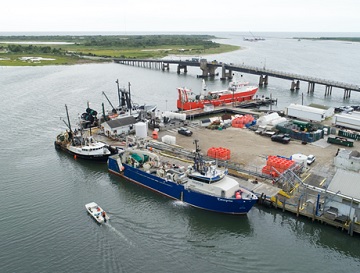
Mid-Water Herring Trawlers to Return to Inshore Waters – Court Overturns Exclusion Zone
Herring fishermen from New England and the Mid-Atlantic won a crucial decision last week when a federal judge in Boston ruled in their favor against an exclusion zone in Northeast U.S. waters. The court ruled that a National Marine Fisheries Service (NMFS) measure excluding the mid-water trawl fleet from productive inshore fishing grounds violated the Magnuson-Stevens Act, the nation’s premier fisheries law. The lawsuit was brought by the Sustainable Fisheries Coalition (SFC), a trade group representing herring and mackerel fishing companies. >click to read< 08:16
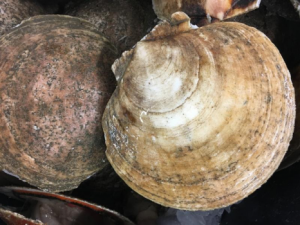
New rules for scallop fishery scheduled to take effect April 1 in Northern Gulf of Maine
A Feb. 17 presentation on upcoming changes to Northern Gulf of Maine scallop fishery management drew a number of New England fishermen to listen to scallop leaders from the New England Fishery Management Council and NOAA. The biggest change for scallop fishermen is that vessels fishing in Northern Gulf of Maine waters will be required to take industry-funded scallop observers on board when selected to do so. Additionally, a portion of Stellwagen Bank in Massachusetts Bay will open for scallop fishing. >click to read< 10:14
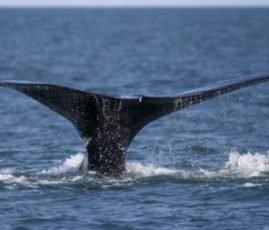
Maine wants whale protections delayed
Maine’s governor and congressional delegation are calling on the federal government to push back new fishing rules designed to protect whales so fishermen can comply with them. New lobster fishing rules require fishermen to start using weakened rope or special inserts to weaken existing rope beginning in May in some waters. They said a lack of compliant gear is making it hard for harvesters to comply with the rules. >click to read< 07:27

Maine: Whale rules, pending lawsuits focus of gloomy Lobster Advisory Council meeting
A complicated and potentially grim future is predicted for the commercial lobster industry, with environmental groups, gear changes, the closure of offshore waters to lobster fishing and judicial rulings painting a “doom and gloom” picture, in the words of Department of Marine Resources Commissioner Patrick Keliher. “I think there’s going to be a lot of moving pieces,” Some of those pieces could spell the end of the commercial lobster fishery in Maine, DMR Deputy Commissioner Meredith Mendelson said, as she ran through the current lawsuits aimed at preserving the North Atlantic right whale. If any or all prevail, the lobster fishery will bear the brunt of the results. >click to read< 08:12

Maine lobster rules should be based on real-world data – the government needs more than guesswork
The people involved in the Maine lobster fishery got a reprieve from new federal whale protection rules last week. U.S. District Court Judge Lance Walker ruled Saturday that the Maine Lobstering Union had successfully shown that a temporary ban on fishing would cause some of their members “irreparable harm.” Walker found that the government scientists failed to show that the rules would protect any whales, or even that there would be any North Atlantic right whales in protected areas to benefit from a closure. >click to read< 10:55

Offshore wind won’t fish – There is no compatible mixing of wind turbines and fishing!
The endangered species of the Maine fishing family is already dancing around the newly announced National Oceanic and Atmospheric Administration (NOAA) restrictions to protect the right whales from gear entanglement. Add several 10,000-ton floating wind turbines, and even more whale restrictions on the NOAA docket (98 percent gear reduction in 10 years), and you have a severely impacted Maine fishing industry.,, I fear NOAA is more a friend to the Green New Deal than to our fishermen, or even our whales. By Rep. Sherman H. Hutchins, >click to read< 14:21
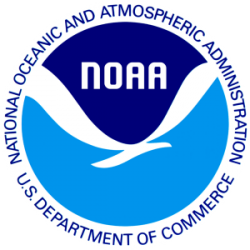
Maine Legislature threatens legal action while Maine Lobstering Union moves ahead – Files Federal Lawsuit
The Maine Legislature is threatening to fight the federal government in court over a set of controversial new seasonal restrictions on lobster harvesting in the Gulf of Maine. Last month, the National Oceanic and Atmospheric Administration released a new set of rules for New England’s lobster fishery aimed at reducing the risk to critically endangered North Atlantic right whales and other whale species. >click to read< The Maine Lobstering Union (MLU) has filed a civil action in the United States District Court for the District of Maine, seeking emergency relief related to the impending closure by agencies of the federal government of productive lobster grounds utilized by Maine’s lobster fishermen and women. >click to read< 11:04
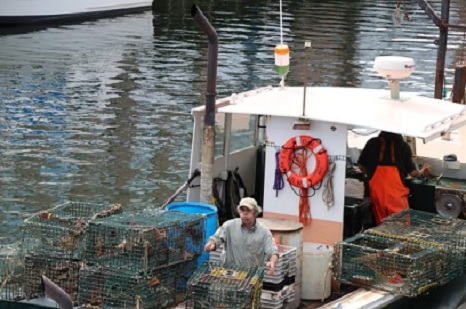
DMR briefs legislature on impact of NOAA’s new lobstering rules, options for appeal
On September 14, the Maine Legislature’s Committee on Marine Resources met and discussed the impact new rules recently released by the NOAA will have on Maine’s lobster industry, as well as the state’s legal options for appealing the rules.,, The new rules not only close nearly 1,000 square miles to lobstering between October and January, a time of year when lobster prices are at their highest, but changes the kind of gear lobstermen can use. Also discussed were threats to the right whale posed by Canada. As Keliher pointed out, the NMFS’ biological opinion noted that even if Maine is  100% successful in taking steps to protect right whales, whales will continue to go extinct if they continue to be hurt in Canada. Keliher also stated that he has had conversations with the head of> NOAA, Richard W. Spinrad, Ph.D < who hasn’t yet had a meeting with the Canadian government, but has agreed to raise the issue of including state representatives in Canadian affairs. Keliher also said NOAA’s head considers these conversations to be a government-to-government issue. He stated he disagrees and continues to press the issue. >click to read< 15:51
100% successful in taking steps to protect right whales, whales will continue to go extinct if they continue to be hurt in Canada. Keliher also stated that he has had conversations with the head of> NOAA, Richard W. Spinrad, Ph.D < who hasn’t yet had a meeting with the Canadian government, but has agreed to raise the issue of including state representatives in Canadian affairs. Keliher also said NOAA’s head considers these conversations to be a government-to-government issue. He stated he disagrees and continues to press the issue. >click to read< 15:51
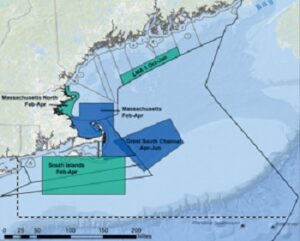
151 Maine legislators call on Biden to rescind new lobster fishing reg’s, while the real threat remains
State legislators have submitted a letter to President Joe Biden requesting (DEMAND!) that his administration take steps to immediately rescind new regulations on lobster fishing. The new regulations, which are intended to protect the endangered North Atlantic right whale,,, Rep. Billy Bob Faulkingham, R-Winter Harbor, a lobster fisherman, initiated the letter. Maine Senate President Troy Jackson also criticized the new reg’s,, “The new 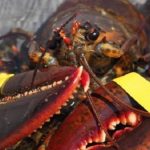 federal regulations are an affront to the men and women who have made a living on Maine’s working waterfront for generations,,, I’m deeply disappointed that NOAA has decided to dismiss the voices of Maine’s lobstering workforce and chosen to go ahead with damaging regulations that do nothing more than hurt our fishermen, while the real threat to right whales remains, Canadian ships.” Video, >click to read< 16:03
federal regulations are an affront to the men and women who have made a living on Maine’s working waterfront for generations,,, I’m deeply disappointed that NOAA has decided to dismiss the voices of Maine’s lobstering workforce and chosen to go ahead with damaging regulations that do nothing more than hurt our fishermen, while the real threat to right whales remains, Canadian ships.” Video, >click to read< 16:03






